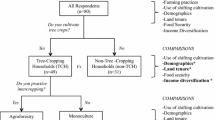Abstract
This study was undertaken to assess farmers’ attitudes toward sustainable agriculture and the environment. The majority of Ontario farmers in this 1991 survey supported the need for government policies which promote sustainable agriculture but there were major differences in the government policies which farmers thought would be sustainable or desirable. Most farmers felt the Government should promote diversified rural economic development, sponsor appropriate research and provide conservation grants to farmers willing to change to more sensitive environmental methods. Those least interested in forms of government intervention designed to enhance agricultural sustainability operated the largest farms. Conversely, those most likely to be receptive to government regulations and interventions designed to enhance rural equity, stability, productivity and sustainability were the smaller operation farmers who most often had off-farm employment.
Similar content being viewed by others
References
Black, A.W., and I. Reeve. 1992. Participation in Landcare Groups: The Relative Importance of Attitudinal and Situational Factors. Paper presented at the Third National Social Research Conference, University of Western Sydney, Hawkesbury, 29 June–2 July.
Breburda, J. 1990. Land-use Zones and Soil Degradation in the Soviet Union. InCommunist Agriculture, edited by K-E Wadekin. London: Routledge.
Buttel, F.H., G.W. Gillespie Jr., R. Janke, B. Caldwell, and M. Sarrantonio. 1986. Reduced-input Agricultural Systems.The Rural Sociologist 6(5): 350–370.
Buttel, F.H., G.W. Gillespie Jr., and A. Power. 1990. Sociological Aspects of Agricultural Sustainability in the United States: a New York State Case Study. InSustainable Agricultural Systems, edited by C.A. Edwards et al. Ankeny, IA: Soil and Water Conservation Society.
Conway, G.R. 1985. Agro-ecosystem Analysis.Agricultural Administration 20: 31–55.
Conway, G.R. 1987. The Properties of Agroecosystems.Agricultural Systems 24: 95–117.
Coughler, P. 1992. Comparative Analysis of Dairy Farm Family Support Systems: New York and Ontario, Master’s thesis, University of Guelph.
Filson, G.C. 1993. Comparative Differences in Ontario Farmers’ Environmental Attitudes.Journal of Agricultural and Environmental Ethics 6(2): 165–184.
Filson, G.C., G. Butyrin, A. Klubov, and V. Krasnov. Forthcoming. Differences between Ontario and Moscow Region Farmers regarding their Attitudes toward Sustainable Agricultural Issues.
Friedland, W., and E. Pugliese. 1989. Class formation and Decomposition in Modern Capitalist Agriculture: Comparative Perspectives.Sociologia Ruralis 29(2): 149–165.
Friedman, K. 1984. Households as Income-pooling Units. InHouseholds and the World Economy, edited by J. Smith, I. Wallerstein, and H. Evers. Beverly Hills: Sage Publications.
Friedmann, H. 1978. Simple Commodity Production and Wage Labour in the American Plains.The Journal of Peasant Studies 6(1): 71–100.
Gasson, R. 1986. Part-time Farming: Strategy for Survival?Sociologia Ruralis 24(3/4): 364–376.
Ghorayshi, P. 1986. The Identification of Capitalist Farms: Theoretical and Methodological Considerations.Sociologia Ruralis 26(2): 146–159.
Gillespie W.W., Jr., and F.H. Buttel. 1989. Farmer Ambivalence toward Agricultural Research: An Empirical Assessment.Rural Sociology 54(3): 382–408.
Hanson, J.C., C.S. Kauffmann, and A. Schauer. 1995. Attitudes and Practices of Sustainable Farmers, with Applications to Designing a Sustainable Agriculture Extension Program.Journal of Sustainable Agriculture 6(2/3): 135–156.
Hassebrook, C., and R. Kroese. 1990. Policy Proposals to Foster Sustainable Agriculture.Journal of Soil and Water Conservation (January/February, 24–27).
McCoy, M. 1992.The Effects of Nonfarm Employment on the Quality of Life of Farm Families in Western Ontario. Master’s thesis, University of Guelph.
McCoy, M.A., and G.C. Filson. 1996. Working off the Farm: Impacts on Quality of Life.Social Indicators Research 37(2):149–163.
Mooney, P.H. 1983. Toward a Class Analysis of Midwestern Agriculture.Rural Sociology 48(4): 563–584.
Norusis, M.J. 1988.SPSS-X Introductory Statistics Guide for SPSS-X Release 3. Chicago: SPSS Inc.
Pineo, P., and J. Porter. 1967. Occupational Prestige in Canada.The Canadian Review of Anthropology and Sociology 4(1): 24–40.
Reeve, I., and A. Black. 1991. Taking the Scales from One’s Eyes: Understanding Farm Attitudes to Land Degradation. A paper presented to the University of Guelph, Rural Extension Studies Department (November).
Reinhardt, N., and P. Bartlett. 1989. The Persistence of Family Farms in United States Agriculture.Sociologia Ruralis 29(3/4): 203–225.
Schmink, M. 1984. Household Economic Strategies: Review and Research Agenda.Latin American Research Review 19(3): 87–101.
Schwarzweller, H.K., and D.C. Clay. 1992. Conceptualizing and Researching Household Survival Strategies. A paper given at the 8th World Congress of Rural Sociology, Pennsylvania State University, State College, Pennsylvania, August.
Stover, R.G., et al. 1991. Successful Family Farming: the Intersection of Economics and Family Life. InRural Sociology and Development, edited by Daniel C. Clay and Harry K. Schwarzweller. Greenwich, CT: Jai Press.
Statistics Canada. 1992a.The Daily (June 4): 1–22.
Statistics Canada. 1992b.The Daily (Nov. 17): 1–25.
Vanclay, F., G. Lawrence and I. Gray. 1992. Environmental and Social Consequences of Capitalist Agriculture: the Australian Context. A paper read at the 8th World Congress for Rural Sociology, Pennsylvania State University, State College, PA, (11–16 Aug.): 1–28.
Winson, A. 1992.The Intimate Commodity: Food and the Development of the Agro-Industrial Complex in Canada. Toronto: Garamond Press.
Wright, E.O. 1978.Class, Crisis and the State. London: NLB.
Author information
Authors and Affiliations
Rights and permissions
About this article
Cite this article
Filson, G.C. Demographic and farm characteristic differences in ontario farmers’ views about sustainability policies. J Agric Environ Ethics 9, 165–180 (1996). https://doi.org/10.1007/BF03055300
Issue Date:
DOI: https://doi.org/10.1007/BF03055300




